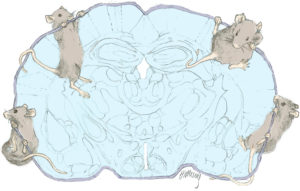Yalcin Laboratory – NeuroGenetics of Mouse Models
Our research is directed at understanding the neurobiology and the genetics of mammalian brain development in health and disease. In neurogenetic diseases, the brain is frequently malformed and patients present with intellectual disability, autism and epilepsy. However, a key unsolved issue is what cellular and molecular mechanisms underlie brain malformations and cognitive impairment.
To address this unmet need, we use innovative large-scale neuroanatomical phenotyping screens in transgenic mouse models.
An important line of research is on the role of WD40-repeat (WDR) genes, one of the largest eukaryotic gene families, in brain development and neuronal connectivity.

Illustration by Helen Whitley to promote our work on mouse brain morphogenesis.
We hypothesize that the miswiring between neurons may contribute to the pathogenesis of neurological symptoms in a new class of diseases we refer to as “WDRopathies”. Over the last few years, we have identified a dozen of WDR genes implicated in murine corpus callosum development including Atg16l1, Coro1c, Dmxl2, Eml1, Herc1, Hira, Kif21b, Nbeal1, Vps13b, Wdr37, Wdr47, Wdr52, Wdr89 and Wdr91.
The second line of research aims to understand why being a female protects your brain against brain malformation disorders in response to genetic mutation. This is an important question in biology and medicine that could improve personalized care for all individuals.
The Yalcin team was created in 2016 at the IGBMC (Strasbourg) through an international call under the auspices of a Chair of Excellence Program before joining the Dijon Inserm Unit 1231 in October 2019 where the team continues to develop an innovative translational program to bridge the gap between discoveries made in biological models and clinical research, with the ultimate goal of improving community health in the field of cognitive disorders.
Team aspiration is to enhance its visibility and the impact of its research program, and attract talent and fundings.
